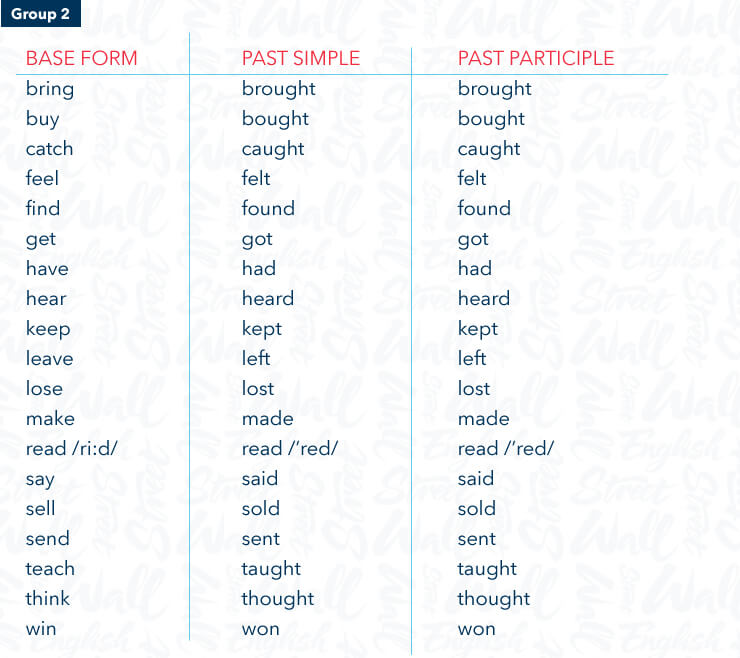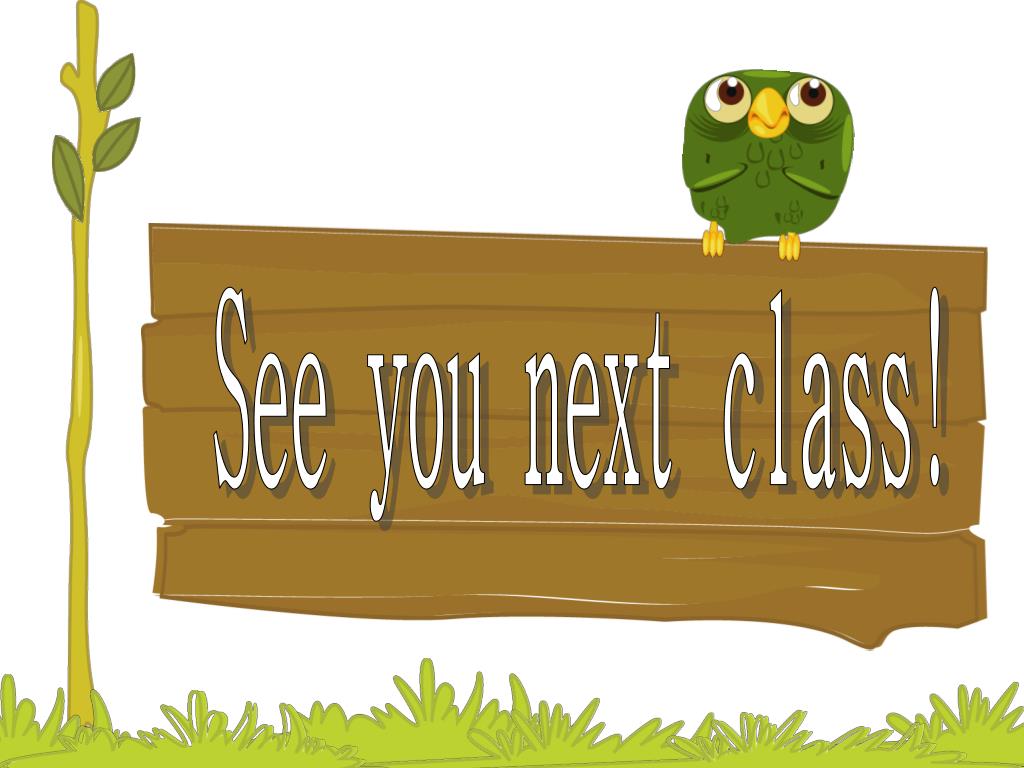HI EVERYBODY!!!!
This week we have to start with a new grammar structure but first it is necessary to remember some verbs that we have been studying along these year an a half.
I need you to remember what regular and irregular verbs are so please read the following information.
In order to use many verb tenses in English, you need to know the past forms of the verbs (Past simple and past participle).
All verbs have a base form or "infinitive" ( for example, look, make , play).
The majority of verbs, called "Regular verbs", follow the same pattern and create the past simple and the past participle using the same word ending, -ed.
There are, however, verbs that have different endings, and these are called "irregular verbs".
In order to use many verb tenses in English, you need to know the past forms of the verbs (Past simple and past participle).
All verbs have a base form or "infinitive" ( for example, look, make , play).
The majority of verbs, called "Regular verbs", follow the same pattern and create the past simple and the past participle using the same word ending, -ed.
There are, however, verbs that have different endings, and these are called "irregular verbs".
What are Regular Verbs?
Regular verbs in English create the past simple and past participle by adding -ed to the base form.
Regular verbs in English create the past simple and past participle by adding -ed to the base form.

If the verb ends in a consonant and -y, we change the -y to -i and added -ed. For example:

If a verb ends in -e we simply add -d. For example:
Here are some examples of regular verbs:
- “Yesterday Jack studied all day.”
- “Raul has accepted the job offer.”
- “Have you finished yet?”
- “We really liked the film we watched last night.”
There are three ways to pronounce -ed, depending on the last letter of the verb.

Do you want to practice your pronunciation?
Go to this link and watch the video.
https://www.youtube.com/watch?v=ghXsfYoKw0c
What are Irregular Verbs?
There are about 200 irregular verbs in English. We can divide these into four types:
- Verbs which have the same base forme, past simple and past participle.
- Verbs which have the same past simple and past participle.
- Verbs which have the same base form and past participle.
- Verbs which have a different base form, past simple and past participle.
A good way to learn irregular verbs is to study them in these groups because as they are similar they’re easier to remember. Here are the most common irregular verbs in these groups.

For example:
- “Our car cost a lot of money but it’s always breaking down.”
- “Pasha hurt himself in a soccer match last weekend.”
- “My parents have let me stay out late tonight.”
- “They put on their jackets because it was very cold.”

For example:
- “They had lunch at a Thai restaurant on Monday.”
- “Have you heard the news about the train strike?”
- “Tim has sent an email to all the suppliers.”
- “Who won the match?” – “The Giants.”

For example:
- “He came back home at 4 a.m. on Saturday.”
- “Suzi has become the Managing Director.”
- “The dog ran into the garden after Lee opened the door.”
- “Has Mrs. O’Connor come back from lunch yet?”
As Irregular verbs are a little bit more difficult to learn here you have a video to practice conjugation and pronunciation.
Click on the following link:
This first class you will have to practice your regular and irregular verbs in base form, simple past and past participle you have to be sure to know their meaning in Spanish.
Then you will have to practice with them on the following exercises. Take a photograph or screen shot as evidence of your work.
Exercise 1.
Exercise 2.
Exercise 3. Now try to remember how to use simple past in affirmative, negative and questions !!!!
IMPORTANT: You need to start learning by heart these verbs as you will have a dictation exam in 3 weeks.
READING ACTIVITIES
Read the following textbook article. Pay special attention to simple past tense verbs. Read the following textbook article. Pay special attention to
past-tense verbs.
Over 100 years ago, people only dreamed
about flying. The Wright brothers, Wilbur and
Orville, were dreamers who changed the world.
Wilbur Wright was born in 1867 and
Orville was born in 1871. In 1878, they
received a paper flying toy from their father.
They played with kites and started to think
about the possibility of flight.
When they were older, they started a bicycle
business. They used the bicycle shop to design their airplanes. They studied
three aspects of flying: lift, control, and power. In 1899, they constructed
their first flying machine—a kite made of wood, wire, and cloth. It had no
pilot. Because of wind, it was difficult to control. They continued to study
aerodynamics. Finally Wilbur designed a small machine with a gasoline
engine. Wilbur tried to fly the machine, but it crashed. They fixed it and
flew it for the first time on December 17, 1903, with Orville as the pilot. The
airplane remained in the air for twelve seconds. It traveled a distance of 120
feet. This historic flight changed the world. However, only four newspapers
in the U.S. reported this historic moment.
The Wright brothers offered their invention to the U.S. government,
but the government rejected their offer at first. The government didn’t
believe that these men invented a flying machine. Finally, President
Theodore Roosevelt investigated their claims and offered the inventors a
contract to build airplanes for the U.S. Army.
December 17, 2003, marked 100 years of flight. There was a six-day
celebration at Kitty Hawk, North Carolina, the location of the first flight.
A crowd of 35,000 people gathered to see a replica of the first plane fly.
The cost to re-create the plane was $1.2 million. However, it rained hard
that day and the plane failed to get off the ground.
You can now see the Wright brothers’ original airplane in the Air and
Space Museum in Washington, D.C.
INSTRUCTIONS. Fill in the blanks with the past tense of the verb in parentheses ( ).
Use the correct spelling. Write the sentences on a separate sheet of paper as you will give them to me.
EXAMPLE: The Wright brothers received a flying toy from their father.
(receive)
1. They ______________ with kites.
(play)
2. They _____________ about flying.
(dream)
3. They ______________ everything they could about flying.
(study)
4. They ____________ a bicycle business.
(start)
5. They _____________ The bicycle shop to design airplanes.
(use)
6. They _____________ to fly their first plane in 1899.
(try)
7. Their first plane ______________. (crash)
8. They ___________ it.
(fix)
9. In 1903, their plane _____________ in the air for 12 seconds.
(stay)
10. They ______________ their invention to the U.S. government.
(offer)
11. The government ___________ to offer them a contract. (decide)
12. Wilbur Wright __________ in 1912.
(die)
13. Orville Wright ___________ for many more years.
(live)
14. Their invention ___________ the world. (changed)
Robert Goddard was born in 1882. When
he was a child, he became interested in
firecrackers and thought about the possibility
of space travel. He later became a physics
professor at a university. In his free time, he
built rockets and took them to a field, but
they didn’t fly. When he went back to his
university after his failed attempts, the other
professors laughed at him.
In 1920, Goddard wrote an article about
rocket travel. He believed that one day it
would be possible to go to the moon. When
The New York Times saw his article, a reporter wrote that Goddard had less
knowledge about science than a high school
student. Goddard wanted to prove that The
New York Times was wrong.
In 1926, he built a ten-foot rocket, put
it into an open car, and drove to his aunt’s
nearby farm. He put the rocket in a field
and lit the fuse. Suddenly the rocket went
into the sky. It traveled at 60 miles per hour
(mph) to an altitude of 41 feet. Then it fell
into the field. The flight lasted 2½ seconds, but Goddard was happy about
his achievement. Over the years, his rockets grew to 18 feet and flew to
9,000 feet in the air. No one made fun of him after he was successful.
When Goddard died in 1945, his work did not stop. Scientists
continued to build bigger and better rockets. In 1969, when the American
rocket Apollo 11 took the first men to the moon, The New York Times
wrote: “The Times regrets the error.”
Instructions: Read the following facts about the history of rockets. Underline the
verbs. Write R for a regular verb. Write I for an irregular verb. Copy the sentences on a sheet of paper from your block and do the exercise.
EXAMPLE: Goddard published a paper on rockets in 1920. R
1. Goddard built and flew rockets from 1926 to 1939.
2. Germany used the first rockets in World War II in 1944.
3. The Russians launched their first satellite, Sputnik 1, in 1957.
4. The Americans sent up their first satellite, Explorer 1, in 1958.
5. Yuri Gagarin, a Russian, became the first person in space in 1961.
6. Alan Shepard, an American, went into space in 1961.
7. The United States put the first men on the moon in 1969.
8. A spacecraft on Mars transmitted color photos to Earth in 2004.
To finish here are the lists of verbs that you will have to study for dictation you will have 2 weeks to learn them by heart.
Irregular verbs for dictation
Base form (infinitive) Simple past Past participle
1. be
2. become
3. begin
4. bring
5. buy
6. choose
7. come
8. do
9. drink
10. drive
11. eat
12. fall
13. fly
14. send
15. feel
16. see
17. speak
18. swim
19. take
20. teach
21. think
22. understand
23. wear
Regular Verbs for dictation
1. Try
2. Play
3. Enjoy
4. Like
5. study
6. carry
7. plan
8. stop
9. arrive
10. fail
11. pass
12. happen
13. touch
14.pull
15. push
16. clean
15. brush
16. wash
17. climb
18. cry
19. start
20. finish
21. continue
22. smoke
23. smile

No hay comentarios:
Publicar un comentario